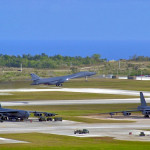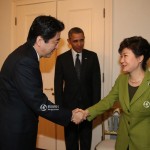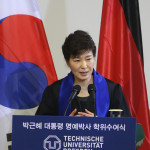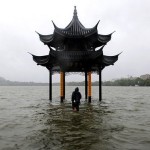- DETERRENCE: Reducing Long-Term Costs While Preserving a Robust Strategic Airlift Fleet
- DPRK: North Korea Urged U.S. Changes Citing Talks with South
- ENERGY SECURITY: Climate Impacts ‘Overwhelming’ – UN
- GOVERNANCE AND CIVIL SOCIETY: Park Unveils Proposals to N. Korea to Lay Groundwork for Unification
- CLIMATE CHANGE ADAPTATION: Integrating Local Hybrid Knowledge and State Support for Climate Change Adaptation in the Asian Highlands
- AUSTRAL PEACE AND SECURITY: Edward Snowden Documents Show Malaysia is an Australia-US intelligence Target
 DETERRENCE: Reducing Long-Term Costs While Preserving a Robust Strategic Airlift Fleet, Options for the Current Fleet and Next-Generation Aircraft, Christopher Mouton et al, RAND MG-1238-AF, 2013.
DETERRENCE: Reducing Long-Term Costs While Preserving a Robust Strategic Airlift Fleet, Options for the Current Fleet and Next-Generation Aircraft, Christopher Mouton et al, RAND MG-1238-AF, 2013.
US global airlift capacity is unique and underlies US power projection, especially strategic and tactical bombers. US allies have begun to supply refueling to US aircraft. All US options to recapitalize its aging airlift fleet pose risks that require hedging. [PDF, 0.7MB]
- Airborne Refueling Pact Paves Way For Regional Push Against China, Carlo Munoz, October 6, 2011
- Air Force to conduct 1st aerial refueling drill with US, September 20, 2011
- Strategic Airlift En Route Analysis And Considerations To Support The Global War On Terrorism, Michael C. Sere, thesis, AFIT/GOR/ENS/05-17, USAF Air University, 2005.
 DPRK: North Korea Urged U.S. Changes Citing Talks with South, Sangwon Yoon, Boomberg. (24 March 2014)
DPRK: North Korea Urged U.S. Changes Citing Talks with South, Sangwon Yoon, Boomberg. (24 March 2014)
North Korea released several statements reaffirming the importance of their nuclear weapons as a treasured sword (보검/宝剑) and an important part of the Worker’s Party of Korea Strategic line, but the formulation omitted use of “non-negotiable”. There was a short term, tactical hiccup represented by North Korea pre-notifying South Korea of an impending artillery firing exercise. The pre-notification likely indicates a DPRKK desire to manage tensions in that particular exchange. However, it may have also been an event to test South Korean reaction time – an unidentified drone was captured in South Korea.
- (LEAD) S. Korea probing unknown drone found on western border island. Kim Enun-jung, Yonhap News Agency (1 April 2014)
- CPRK denounces Park Geun Hye’s provocative remarks over Nuclear Issue. Rodong Sinmun. (28 March 2014)
- WPK’s new strategic line is ever-victorious banner, Rodong Sinmun. (1 April 2014)
 GOVERNANCE AND CIVIL SOCIETY: Park Unveils Proposals to N. Korea to Lay Groundwork for Unification, Chang Jae-soon, Yonhap News (29 March 2014)
GOVERNANCE AND CIVIL SOCIETY: Park Unveils Proposals to N. Korea to Lay Groundwork for Unification, Chang Jae-soon, Yonhap News (29 March 2014)
ROK President Park laid out a proposal for unification with the DPRK last week, now known as the Dresden Doctrine, based on increased long-term exchange and cooperation on the peninsula. The plan calls for increased humanitarian aid projects, expanded economic cooperation including in partnership with China, and increased cultural exchanges. While the DPRK has yet to issue an official response, articles have so far called it “bits of useless junk”.
- Park calls for focus on unification with N. Korea, Yonhap News (1 April 2014)
- Uncertainty lingers over Park’s Dresden proposals, Song Sang-ho, Korea Herald (30 March 2014)
- North Korea calls Pres. Park’s Dresden Doctrine ‘bits of useless junk’, Choi Hyun-june and Seok Jin-hwan, Hankyoreh (2 April 2014)
 CLIMATE CHANGE ADAPTATION: Integrating Local Hybrid Knowledge and State Support for Climate Change Adaptation in the Asian Highlands, Jianchu Xu & R. Edward Grumbine, Climatic Change, Springer (2 March 2014)
CLIMATE CHANGE ADAPTATION: Integrating Local Hybrid Knowledge and State Support for Climate Change Adaptation in the Asian Highlands, Jianchu Xu & R. Edward Grumbine, Climatic Change, Springer (2 March 2014)
In the Asian Highlands, an integrated approach that blends strategies to secure more resource access for local people could pave pathways toward successful climate adaptation, more inclusive governance, and greater state stability. To accomplish this, leaders would have to reframe state-led decisions as more ecological, efficient, and equitable means of managing risks in an increasingly uncertain world.
- Innovation as an Expression of Adaptive Capacity to Change in Himalayan Farming, Tor Halfdan Aase, Prem Sagar Chapagain and Prakash Chandra Tiwari, Mountain Research and Development, vol. 33, no. 1, pp. 4-10 (2013)
- Upstream, Downstream, China, India: the Politics of Environment in the Himalayan Region, Piers M. Blaikie and Joshua S. S. Muldavin, Annals of the Association of American Geographers, vol. 94, issue 3, pp. 520-548 (2004)
 ENERGY SECURITY: Climate Impacts ‘Overwhelming’ – UN, Matt McGrath, BBC News, 31 March 2014
ENERGY SECURITY: Climate Impacts ‘Overwhelming’ – UN, Matt McGrath, BBC News, 31 March 2014
Drums roll again. Periodic song-and-dance – “See what we know.” “We know more than we did before.” “The worst is yet to come.” “The cost of inaction is compounding.” Can be played every five or fifteen minutes or decades. Modelers model what they want to believe. And then sit around and agree to agree. Except when they don’t. Someone earns the epithet “fringe”. Do-anythingism in the name of science will continue.
- A bigger nod to uncertainty in the next climate panel report on global warming impacts, Andrew C. Revkin, New York Times blog DotEarth (25 March 2014)
- Scientists clash over UN climate report, Pilita Clark, Financial Times (31 March 2014)
- Britain calls for global action against climate change, Business Standard (1 April 2014)
 AUSTRAL PEACE AND SECURITY: Edward Snowden Documents Show Malaysia is an Australia-US intelligence Target, Philip Dorling, Sydney Morning Herald (30 March 2014)
AUSTRAL PEACE AND SECURITY: Edward Snowden Documents Show Malaysia is an Australia-US intelligence Target, Philip Dorling, Sydney Morning Herald (30 March 2014)
Were the Australian-coordinated multilateral search for Malaysian airline MH370 and Crimea-triggered Chinese power plays in the South China Sea not so serious, it could be a Monty Python version of alliance relations. Spiegel revelations that US and its electronic intelligence allies target leaders of Malaysia – and of Indonesia, Japan, Philippines, South Korea, Taiwan – do not augur well for trust in the allies and partners of the Pacific pivot.
- Filling in some of the missing from Greenwald’s [Der Spiegel’s] “release” of the Target Knowledge Base list of 122 world leaders spied on by NSA in 2009, TOP SECRET//COMINT//REL TO USA, AUS, CAN, GBR, NZL//20320108, Machine vs. manual Chief-of-State citations, Cryptome, (March 2014)
- The Ultra Syndrome: did it hamper the search for flight MH370? Sam Bateman, The Conversation, (24 March 2014)
- Eyes on Crimea, China makes its move, Donald K Emmerson, Asia Times (17 March 2014)
The Nautilus Peace and Security Weekly Report presents articles and full length reports each week in six categories: Austral security, nuclear deterrence, energy security, climate change and security, the DPRK, climate change adaptation and governance and civil society. Our team of contributors carefully select items that highlight the links between these themes and the three regions in which our offices are found—North America, Northeast Asia, and the Austral-Asia region.
- Subscribe to NAPSNet to receive free weekly email reportsEditor
Contributors:
- Deterrence: Peter Hayes
- Governance and Civil Society: Dyana Mardon
- Climate Change Adaptation: Saleem Janjua
- DPRK: Roger Cavazos
- Austral Peace and Security: Richard Tanter

